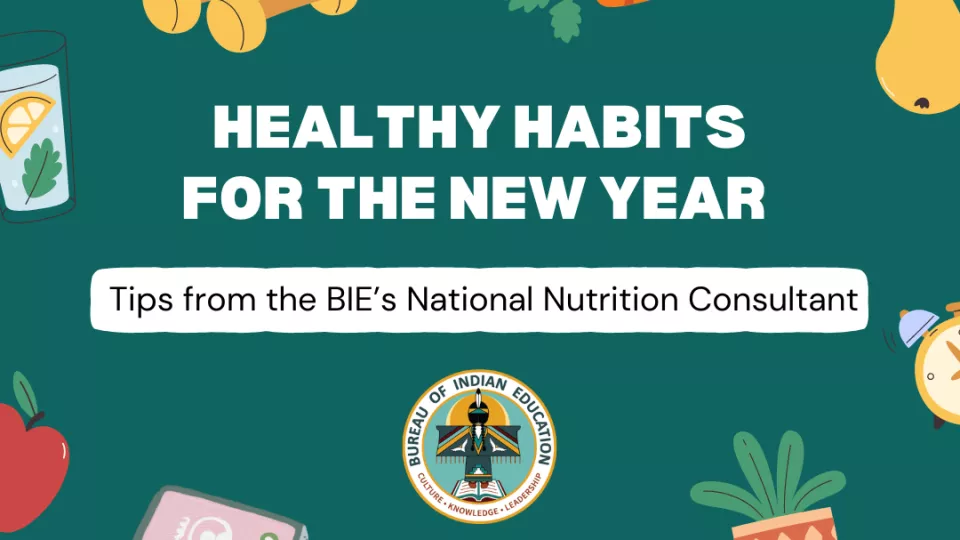
January is National Staying Healthy Month, a perfect time to prioritize wellness and set the tone for a healthier year. Lt. Cmdr. Casey Cavanaugh, National Nutrition Consultant for the Bureau of Indian Education, shares seven practical tips to help you maintain healthy habits and create a balanced and thriving lifestyle.
- Focus on Fiber
Including more fruits, vegetables and whole grains in your diet is a simple yet impactful way to improve overall health. Fiber supports digestion, helps maintain a healthy weight, and reduces the risk of chronic diseases. According to the USDA, most Americans fall short of their recommended daily fiber intake. Aim for three to five servings of fruits and vegetables daily. Start small by adding one extra serving to your meals each day, and explore options like whole-grain bread, brown rice or quinoa. Visit ChooseMyPlate.gov for resources on creating a balanced plate with fiber-rich foods.
- Limit Screen Time
Reducing screen time can improve focus, mental well-being and overall health. The Centers for Disease Control and Prevention recommends limiting recreational screen time to no more than two hours per day. Excessive screen time is linked to sedentary behavior, which can increase the risk of obesity and other health concerns. Use tools like screen time trackers on your devices and schedule regular breaks to disconnect. Learn more about screen time guidelines at CDC.gov.
- Stay Hydrated
Water is essential for maintaining energy levels, supporting digestion and optimizing nutrient absorption. Even mild dehydration can lead to fatigue and reduced concentration. Make hydration a habit by keeping a water bottle with you throughout the day and aiming for eight glasses or more daily. For tips on staying hydrated, visit the National Institute of Health’s NIH’s Hydration Facts.
- Get Enough Sleep
Adequate sleep is the foundation of good health. The National Sleep Foundation recommends 7-9 hours of quality sleep for adults each night. Sleep helps your body recover, supports cognitive function and improves your mood. Establish a consistent bedtime routine and create a sleep-friendly environment by limiting light and noise. Explore sleep health resources at SleepFoundation.org.
- Practice Mindful Eating
Mindful eating involves paying attention to your meals without distractions, helping you make healthier choices and control portion sizes. Studies show that eating in front of a screen can lead to overeating. Instead, focus on your food, chew slowly and drink water between bites. This practice not only aids digestion but also enhances your enjoyment of meals. Check out USDA’s mindful eating tips at Nutrition.gov.
- Stay Active
Physical activity is vital for cardiovascular health, weight management and mental well-being. The Physical Activity Guidelines for Americans recommend 150 minutes of moderate-intensity exercise per week. If you’re short on time, remember that small actions add up. Take the stairs, go for a short walk or try a quick workout at home. Find exercise ideas and guidance at Health.gov.
- Manage Stress
Chronic stress can take a toll on your physical and mental health. Practicing stress-relief techniques like deep breathing, meditation or engaging in hobbies can help lower cortisol levels and promote relaxation. Activities like beading, sewing or journaling can serve as therapeutic outlets.
The BIE Behavioral Health and Wellness Program offers free and confidential behavioral health and wellness support services for students and staff at all entities funded by BIE. If you are in a behavioral health crisis, you can call the 24/7 BIE BHWP Call Line to connect with a crisis support professional.
Lt. Cmdr. Casey Cavanaugh highlights the importance of viewing health as a journey rather than a destination. She encourages individuals to focus on gradual changes that fit into their daily routines, making wellness a sustainable and rewarding effort.
"Start small, be consistent and celebrate progress along the way," she advises. "National Staying Healthy Month is a great opportunity to make wellness a priority, not just for January but for the entire year."
For more information and resources to support your health journey, explore Nutrition.gov and CDC.gov.
Contact
Office of Communications
Bureau of Indian Education Central Office
U.S. Department of the Interior
1849 C Street NW, MIB-3610
Washington, DC 20240
Telephone: 202-941-0789
Email: biecommunications@bie.edu





